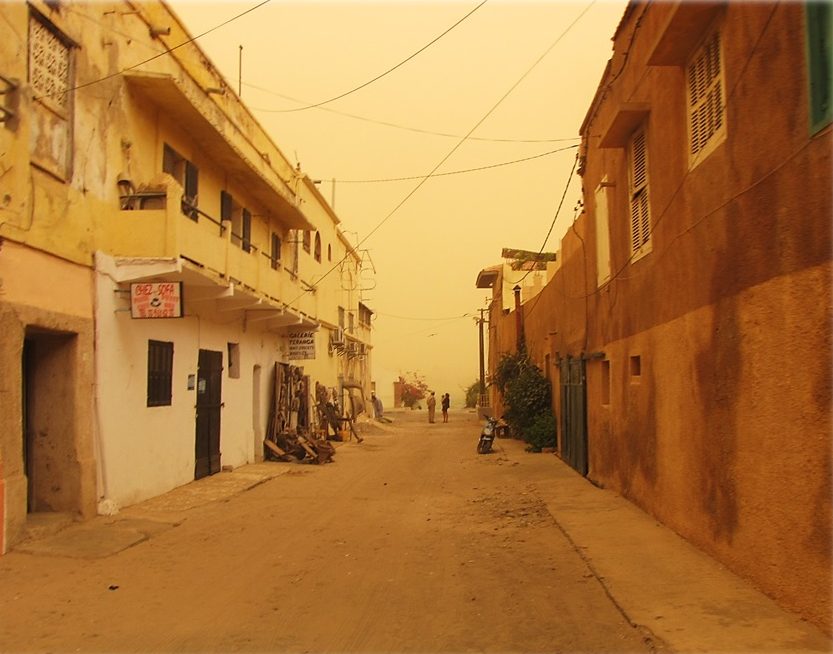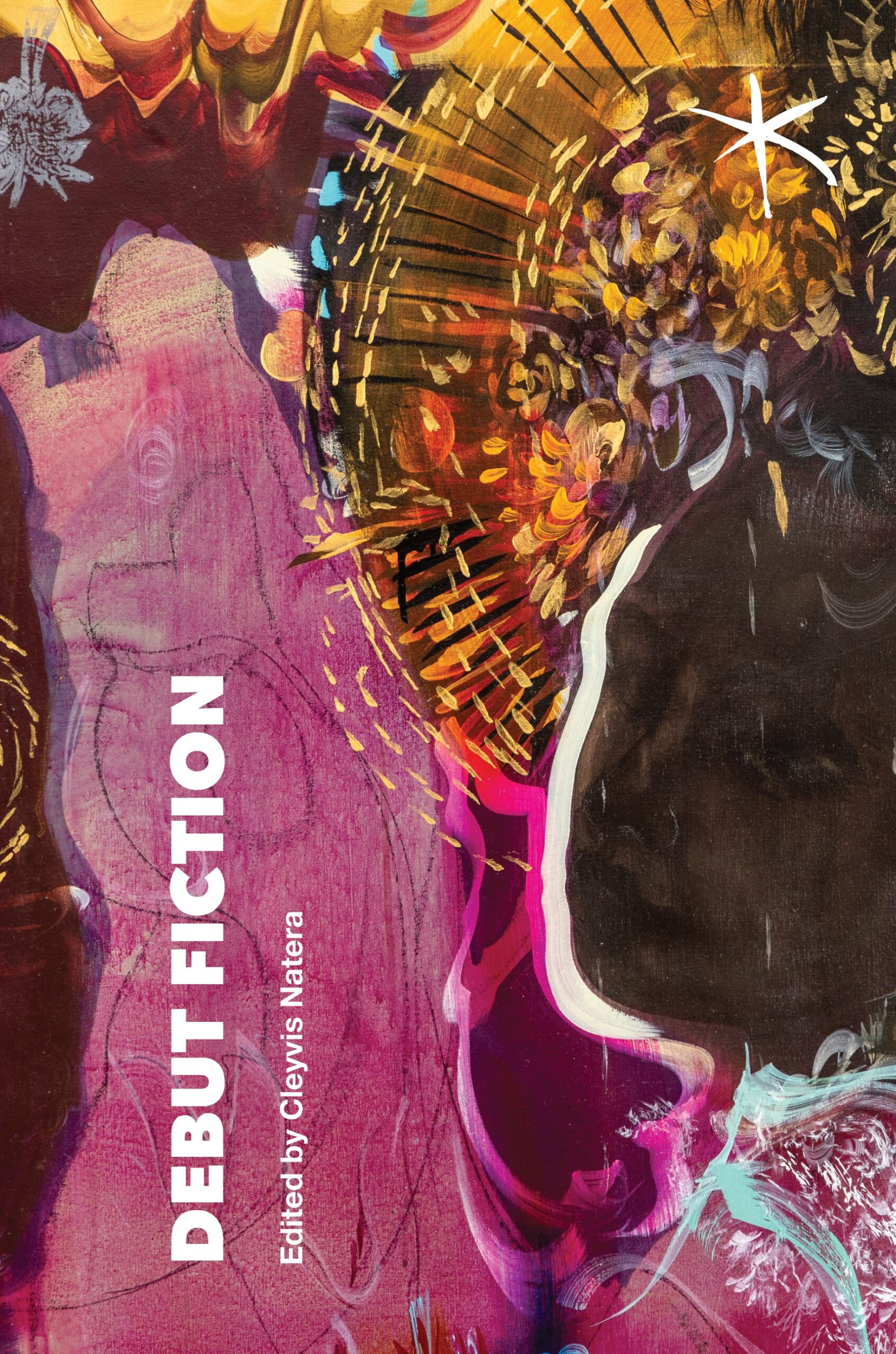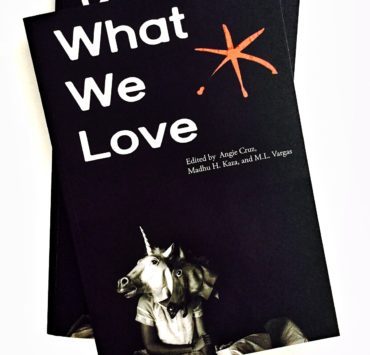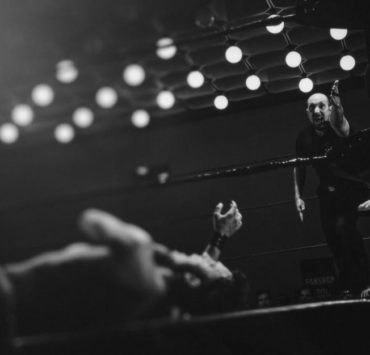
The day Nani left her husband the mist that had earlier covered the morning skies cleared, the mild harmattan wind scattered plastic bags around her feet. There was nothing to suggest that something momentous had happened, except that her heart beat so quickly she thought she might faint. As she neared the part of Enugu where traffic was slower and houses had shrubbed fences and carefully manicured lawns, she slackened her pace. Instead of mechanics’ garages and hasty zinc constructions lining the streets, here there were flowers and trees with pink and purple and yellow blossoms. Even the air seemed different. It was unhurried, generous. Obiagu was a concrete jungle: houses built so close together they seemed to stand on each other’s toes.
She had almost forgotten that Enugu was beautiful and hot. Sweat dribbled down between her breasts, behind her neck, puddled under her armpit. Her throat itched from thirst. She still had three out of five bags of pure-water that she had bought from a street hawker peddling them in a wheelbarrow. She removed the sweater and stuffed it into her bag. She drank one bag of water, splashed the second one on her face and neck. Her eyes fell on her feet. The state of them – dry and cracked – Her mother would say; “Thieves’ feet.” As if you could tell the character of a man from their feet. As if everyone with soft, moisturized feet were epitomes of goodness. Her husband, Meshach had soft, baby feet. He was meticulous in keeping them soft, first soaking them in hot water for several minutes, and then having Nani scrub them with a pumice stone, rubbing the bottoms in slow circular motions while he directed her.
She didn’t have much to fill the duffel bag hanging from her shoulders. Meshach had forced her to live a spartan, austere life. What weighed her down was inside of her. No bag would be big enough to carry it. But now, she hoped to discard that weight, shed it bit by bit, until she once again became that Nani who teachers had said was so light on her feet she could fly.
“You should run for Nigeria. With the proper training, you’ll make a superb athlete,” her sports teacher had told her.
If he saw her now, she thought, dragging her feet – where the burden inside her settled – as she walked, he would not recognize her.
Number 47 Osumenyi Street was home. And there she was returning, sweaty, damp under her armpits, heavier and more broken. Her feet cracked and her knuckles calloused. So exhausted from the long walk she regretted not taking a taxi. But on sighting the house, the heaviness lifted. This must’ve been how the Israelites felt on seeing the promised land. After seven years with Meshach, she couldn’t even make a comparison without referencing the Bible. Her lips, too, were cracked from the harmattan and felt like sandpaper to the touch. She regretted having rushed out without dabbing some Vaseline on them first. But she feared that any extra minute spent at Meshach’s would coat her in a viscosity that would make it impossible to leave. Her sister instructed her to leave. Leave immediately. She said go straight away home. She would find peace in her childhood home, as if peace were a surprise birthday present Ugo had hidden waiting for Nani to discover, the way she used to do when they were children.
After being gone for seven years, the affluent essence of Umuomam Estate had not changed. Even from afar, houses wide and huge, spread out like laundry hung out to dry. Satellite dish masts floated like ghosts above the roofs. The road to the estate wound past the private secondary school Nani went to. Protected by its high fence with barbed wire edges, through which, as she walked past now, she could see students in the familiar pink and blue pinafore running around, blissfully unaware that life didn’t always unfurl in the way one wanted. Thinking of it now brought a familiar tightness to Nani’s throat. She hadn’t cried since this morning when a neighbor she hardly knew sat her down and got her thinking. “This man don’ suffer your body plenty. Look at you? Fine girl like you? Why you let someone sit on your happiness like that? Why you let someone chop you so like mango?” She did feel like a mango, sucked so dry that the fibres had turned white.
The school bell rang for the end of break as she reached the gate leading into the estate, as if signaling the end of her life with Meshach. Or the beginning of a new life without him. With sudden, unexpected excitement, she saw herself working in a hospital, a stethoscope around her neck; imagined herself stretched out in front of the TV, a glass of wine by her side after a long day’s work, like her mother used to. Ding! Ding! Ding! Each ding, Ugo’s voice telling her: Leave. Leave. Leave. Her feet obeying. Ding! Ding! Ding! Her pace increased. Once she walked in, she swore to herself, there would be no turning back. This was it. She stopped, looked around, took a deep breath, and as if she was diving into water, she held her breath and walked in. The heaviness – as heavy as ice – which had suffused her body, fell off completely, dissolving and gathering in pools of water around her feet as she exhaled. Again, she felt like the Israelites in the Bible and resisted the urge to kneel in the middle of the road and kiss the blessed ground. She didn’t want to attract any attention. But who would recognize her? Even her own sister had been shocked at her appearance the last time they met two years ago.
The houses on the estate were big and opulent, with wrought iron gates. Uniformed men on guard. Unlike the other houses, house number 47 had changed. Nani imagined it to be a stately, beautiful mansion with wide, sliding windows, but it had transformed into a big, rambling object she barely recognized. One window had a crack which was plastered over with duct tape. Her mother, punctilious to the point of obsession would never have allowed duct tape on her windows. It looked like somebody else’s house now. The outside was no longer the dark chocolate brown of her memories – a color chosen by her ever pragmatic mother for its ability to absorb the dust of Enugu and hide it – but the dull, stained yellow of a decayed tooth.
In all the time that Nani was gone, she had never once passed by the house. She never even came anywhere near the estate. At the beginning, she couldn’t have come even if she had wanted to but much later she still didn’t. Had it been embarrassment or fear which had kept her away? In any case, what would she have come back for? She had lost touch with all her friends. Nobody she knew seven years ago was still around. Nkiru, Ugo told her, lived in Canada now. Montreal. The Ejimofor twins had moved to London. From their Facebook posts Ugo could tell they were doing well. Nani certainly did not recognize any of the security guards and so far, nobody had recognized her, or they would have been at the door. She was grateful for that.
The house looked bigger than it did when she lived there, as if it were dough rising and expanding, spilling off the kitchen counter. She wondered if it was magnified because she had become used to small, narrow spaces. Rooms so small that she could not stretch out without hitting something or walk without stumbling – like one walking in the dark – into one of the many objects crowding it: a suitcase, a table fan, a Bible. And shoes. Childrens’ shoes. Men’s shoes. She had kept hers under the bed, hidden from view, and would have kept everyone else’s under beds too but those were crowded as well. Pots. Pans. Bags. The house spawned more things than it could contain, cluttering every nook and cranny of it. When she saw the children stumbling and falling into the chaos, and was helpless to pull them out of it, she closed her eyes and imagined she was back home. But this trick which had worked for her in the past, the magic carpet which could take her far from the cluttered house in which she could not breathe, did not work once the children joined her. They had never been to number 47. To be here without them, now under these circumstances, felt like a betrayal.
They would return to Obiagu Road, expecting to find her waiting, having no idea that she was gone. They would call for her and search for her, shouting “Mamman? Mamman?” But she would not be there to love them with her hugs. They would cry for her and Meshach would be the one to hold them and tell them,”Shhh. Stop crying. Papa is here! We do not need Mamman.” They would be comforted. He would make them shriek with laughter and forget that they were missing their Mamman. They were children after all. The heaviness that she had shaken off earlier began to sneak back in. She could not do this. But she had to do this. Even if she longed to have them with her right now one day soon Holy, PraiseHim and GodsOwn will run around in the front yard at Number 47. Her chest felt heavy. She swallowed to force down the lump forming in her throat. She must not think of the children now. She had to escape.
The guava tree by the gate was gone. It was now a stump with tiny mushrooms growing wildly all around it, an amputated limb sticking out of the earth. Who cut it? It couldn’t have been her mother, whom she and her sister had never got out of the habit of calling Mommy. Or Mommy Superstar. She loved that tree like a child. In turn, the tree had been faithful to her, producing baskets of sweet seedless guava which she liked to peel and freeze. Her daughters made fun of her. They didn’t know anyone else who peeled guava or who ate the fruit frozen. She didn’t mind the teasing. Not about the guava or any of her other strange habits. Her usual response was that if she sat around waiting for other people to endorse her ways, she would lead a sad life. Her mother made her own rules and tried to teach her daughters to do the same. But her mother failed spectacularly with Nani. She defied the poor woman’s belief that confidence was something one could pass on, like fair skin or thick hair. Her mother’s excess of self-confidence spilled onto her sisters bypassing her middle child completely. If Nani had been just a little bit more like her mother, she would never have found herself with Meshach. Confident people – like her mother, like Ugo, like her sister Udodi (before she died) were not soft around the edges as she was. They were capable of being nice but their niceness had a quality of assured hardness to it. Nobody could take advantage of them.
Nani noticed that the bench which used to stand beside the tree was gone also. Perhaps, it had been stolen and was now outside another house, accommodating the weight of other people who had no idea what role it had played the day Meshach turned up. Meshach, she spat; a dirty habit which under normal circumstances she abhorred, but which now seemed appropriate, as the name curled into her mouth and settled on her tongue like sour milk.
She slipped the key into the padlock, turned until she heard it click, and pushed the gate open. The gate had become arthritic and creaked loudly as she closed it behind her, pushing against it with both hands.
She had been carried through these gates when they still swung open noiselessly. She was about eight years old and had gone walking round the estate with her father, Doda. She must’ve stubbed her toe or something because Doda had to carry her back. The guard’s room was open and she looked in, as if she expected to see his wiry frame. The room was empty. Even though it had been several years, she felt guilty about the guard and the punishment he suffered for letting her go. But she allowed herself only a moment of self-reproach. Old newspapers and rodent droppings carpeted the floor. Obviously, Aunty Enuka who came in regularly to check on the house and to frighten potential squatters away had not been in the guard’s room for a while.
Although the jacaranda tree still dazzled in its blueness in the front yard, the orchard in the backyard – her mother’s pride and joy – was now a sprawling graveyard of broken things: a kitchen stool; a magazine rack; a baby swing. Nani spied something that looked like the decapitated head of a doll. It rolled over when she nudged it with a foot, and two plastic blue eyes stared out at her from a dirty, smudged face. It looked as if someone had tried to burn it. The sight of it triggered a memory, the smell of burning hair deep in her nose. She was here to pick up the shattered pieces of her life and make it whole again. But how could she if she kept walking into memories.
Goose pimples crawled up her arms and she half walked, half ran, dragging her bag behind her back like an indolent pet to the front of the house and through the front door, into the parlour where so much of her childhood had unfolded. But this had acquired a new smell: the sickly sweet odour of something wrapped and locked away in a suitcase full of mothballs – specifically camphor – for many years. She could not imagine where the smell came from. Her mother never even used camphor. The smell disgusted Mommy.
The rooms – despite smelling different – had retained their colors but the effect was muted now. No longer bright and shiny and electric, so that Nani’s father – whom they all called Doda because for some reason, that was what Udodi, the oldest child had called him from the moment she could speak – complained that he got a migraine from being inside and why couldn’t Mommy Superstar have used such bright colors for the outside of the house instead of inside where he couldn’t escape it? It was like the sun shining in your eyes, he said. The walls looked almost timid now, shrinking violets of colours, not daring to show their faces. Nani had expected to be comforted by the familiarity of home but nothing was as she remembered it. It wore the look of one that had been abandoned for years, accumulating dust and grime, yet it had only been two years since her mother and Ugo left.
Nani had not been in the house more than five minutes when her cell phone began to ring. She glanced at the screen. Ugo. Seven years had changed the balance of their relationship. Nani was older but anyone listening in would not have suspected that. Ugo, two years younger sounded like an older sibling.
“Have you bought your ticket? When are you coming?”
“I’ve only just arrived. I’ve left him. Isn’t that enough? I’ve left, Ugo.”
“It is not enough.”
It did not surprise Nani that her first step on the moon was not a huge one for Ugo. Her voice was smooth and confident and boomed as if she were standing next to Nani and talking right into her ears instead of being a continent away.
“It. Is. Not. Enough.” She had always been the stronger one. “It is. Not. Enough. How can you think that it is? Nani. It is not just yourself you have to think about! You are not 17 anymore. Grow up!”
Her words, sharpened and carefully aimed, did not miss their mark. Nani took it silently and waited until Ugo’s tirade died down to say,
“I have heard. We’ll talk later.”
She could get angry but she understood Ugo would never deliberately try to hurt her. She was forthright but it was a forthrightness tempered always with kindness. She didn’t have the ability to be malicious. Nani had shocked her sister with her story. She was determined to get Nani out of Meshach’s house. Ugo believed that people could control their fate, that consequences were determined directly by actions. But Nani knew that it wasn’t as simple as all of that.
Ugo had shrieked, “He did what?” each time Nani carefully served a part of the story to her sister and then Ugo repeated her words, “You said he threatened to burn you? Actually lit a candle and brought it to your hair?”
Ugo didn’t even know the entire story. Some stories form a tsunami of words and drown one if allowed to spill out at once.
Ugo pushed and pushed and pushed Nani until she did what she had thought she was incapable of. She packed the life she had with Meshach into her father’s duffel bag and walked headlong into the future Ugo was charting for her: First stop, house 47. Next stop, America.
“I am just catching my breath,” Nani told Ugo from inside house 47.
“You’ll catch your breath in America. Plenty of time for that. It is toxic for you to stay there, to be so close to… to…” Ugo’s voice was tight and packed. “Nani, leave this minute. How. Did. You. Get. To. This? Leave!”
There was no space for Nani to snake in. When they were younger, their father nicknamed his youngest daughter, Ugo the Stubborn, the “stubborn” soaked in tenderness. Nani was the Peacemaker; always afraid of confrontations.
“I cannot leave for America. Not just yet.” She thought of her children and left the rest unsaid but Ugo responded as if Nani had said it anyway.
“You’re stronger than you think. You can. You will. Look what you’ve done already. Mommy and I have been talking…” The mention of their mother spoiled Nani’s mood. Why, she thought, could her sister not talk to her without bringing their mother into it? She pretended that her reception had gone bad, and shouted Hello! Hello! into the phone, shouting above Ugo’s own insistent “I can hear you. Can you hear me?”
Hello! Hello! Nani drowned out her sister’s words, and then groaned for good measure, complained about the poor reception, before hanging up on Ugo. Almost immediately, the phone started to ring again. A ringdringdrindring that pierced through the silence of the house. She threw it in her handbag to bury the sound. She was drained. Forty minutes it had taken her to walk from Meshach’s to the estate. Forty minutes in the sweltering heat but she did not care. Every part of her ached, but there was no point to freedom if it was painless.
Image Credits: T.K. Naliaka

Chika Unigwe was born in Enugu, Enugu State, Nigeria. She is the author of four novels, including On Black Sisters Street (2009, 2011 Jonathan Cape, UK and Random House NY) and Night Dancer (Jonathan Cape, 2012). Her short stories and essays have appeared in the New York Times, the Guardian, Guernica, Aeon and many other journals. Her works have been translated into several languages. A recipient of several awards and fellowships, she has recently been awarded a teaching position at Brown University, Rhode Island.







